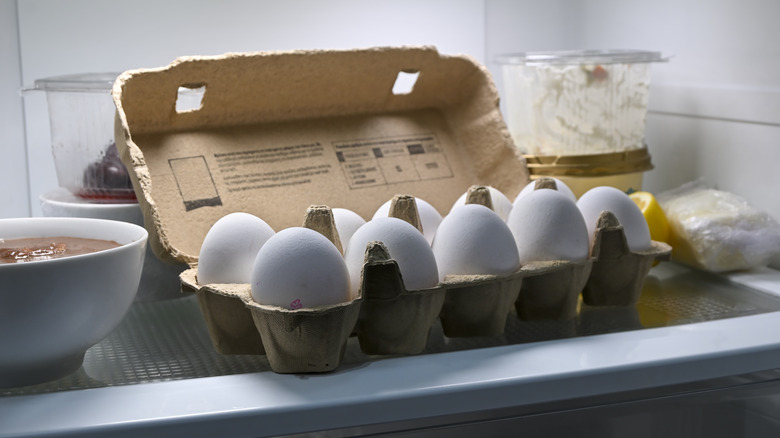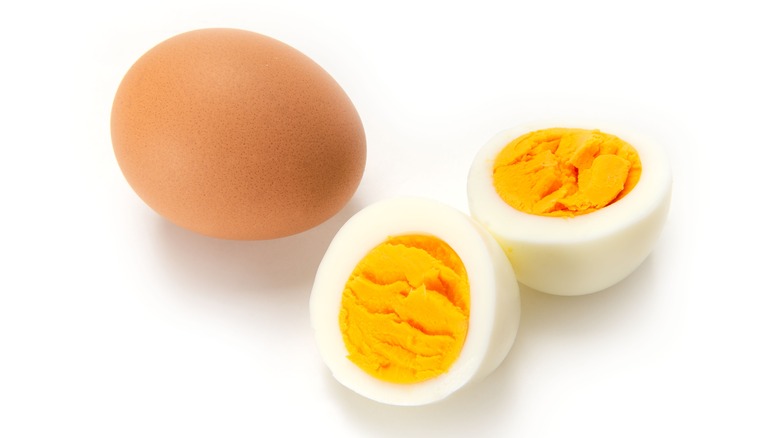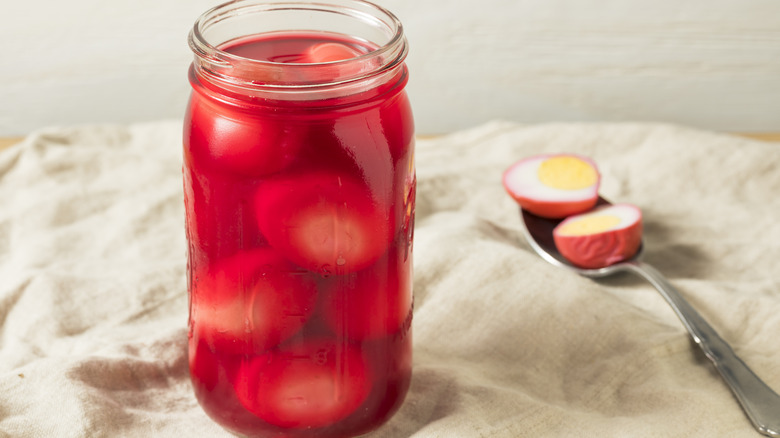How Long That Fresh Batch Of Hard Boiled Eggs Will Last In The Fridge
While it's easy enough to fry, poach, or scramble just an egg or two at a time, most directions for boiling eggs call for at least half a dozen. This is all well and good if it's Easter time and you're simply dye-ing to bust out the Paas kits, but if you're more of an occasional boiled egg eater, you might be wondering just how long you have to use up the batch before it goes bad. Here's a hot tip: Don't remove the shells right away, since peeled eggs won't taste as fresh the next day.
If you keep your eggs in their shells, they can last for up to a week, which means if you eat one each day, you should be good. On the seventh day, you can go egg-free or perhaps enjoy a very small omelet, but don't overdo it — the Mayo Clinic says you shouldn't consume more than seven eggs per week.
If the idea of downing an egg a day doesn't appeal, there's always a workaround. Instead of boiling a single egg at a time, might we suggest buying boiled eggs from a gas station? Even though they're pre-peeled for mess-free eating, the way they're prepared and packaged in plastic means they should stay good for a week sans shell. The best thing about these eggs, though, is that you can buy just one at a time.
Boiled eggs don't last nearly as long as raw ones
While you might think that cooking would automatically extend a food's shelf life, this isn't always the case. Sure, once you bake the chicken breast that's been thawing in the fridge, you have another three or four days to eat it, the reason being that high heat will kill off any bacteria that's started growing on the surface (up to a point — if the chicken's been thawing for over 48 hours, all bets are off). With eggs, though, the opposite is true, since uncooked eggs in their shells can last up to five weeks in the refrigerator.
Outside the fridge, a carton of American eggs can start breeding bacteria after just two hours. Many European and Asian countries, however, are able to store their eggs at room temperature. Do they have hardier breeds of bacteria-free chickens there? No, the difference in storage methods comes down to how the eggs are processed. In the U.S., our eggs are washed before packing to ensure that they're pristine and poop-free. Unfortunately, however, the washing destroys a protective layer called the cuticle. With cuticle intact, unrefrigerated eggs can last for up to three weeks. As to whether this affects the storage time of boiled eggs, this doesn't seem to be the case. The U.K. is an unwashed egg country, but there, too, the recommendation is that boiled eggs should need to be refrigerated and eaten within a week.
Egg salad's not the only way to use up those boiled eggs
If you've boiled up a batch of eggs and you're getting less and less enthused about eating them as-is, you have various options at your disposal. (Except for an actual disposal, of course -– not only is food waste a big no-no, but eggshells could clog up the motor). Sure you could always go with egg salad sandwiches for lunch, but those can be kind of boring. It might be more fun to experiment with different ways of making deviled eggs and then pretend you're having a picnic. If you'd rather imagine yourself in a British pub, make Scotch eggs, instead.
Other ideas for those leftover hard-boiled eggs include quartering them to add to a chef or Cobb salad or bowl of ramen noodles or slicing them and smothering them with Russian dressing to make a '70s throwback called oeufs a la Russe. Unfortunately, freezing boiled eggs is not recommended as the whites go all rubbery. If you really want them to last a good long time, what you can do is soak them in a vinegary brine to make pickled eggs. Since vinegar helps to keep bacteria away, properly pickled eggs can last up to four months in the refrigerator.


